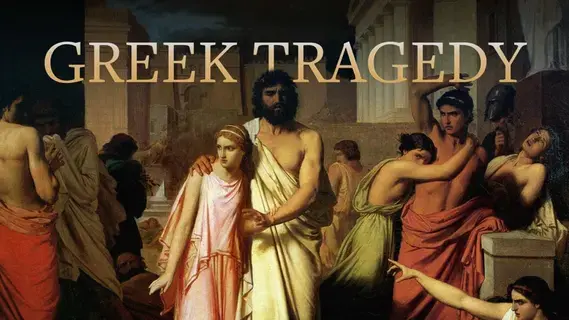Greek Tragedy
Self-paced course
Price
$24.99
Rating
Overview
Two-and-a-half thousand years after they were written, ancient Greek Dramas such as Eumenides, Oedipus the King, and Trojan Women retain a compelling, almost incantatory power. These plays have attracted focus and reflection from Aristotle, Freud, Nietzsche, and others who Professor Vandiver observes early in the course:
"It is a notable paradox that Greek tragedy, a dramatic form that flourished for less than a full century, a dramatic form that began in a particular religious festival of a particular god some 2,500 years ago, remains vibrant, alive, and productive today.
"It seems that there is something about tragedy that lifts it out of its particular circumstances and beyond its particular gods, social issues, and political concerns to give a kind of universality that is, in the last analysis, very surprising."
The great tragedies shed light on the extraordinary time, place, and people that produced them.
And they may help us—as perhaps they helped their original audiences—to grasp a fuller sense of both the terror and wonder that life presents.
A Rounded View of a Grand Art Form
Professor Vandiver has designed these lectures to give you a full overview of Greek tragedy, both in its original setting and as a lasting contribution to the artistic exploration of the human condition. There are three main points to the course:
First: The Plays in Their Context. You learn to see Greek tragedy as a genre in its cultural context. Why did this powerful art form flower in the Athens of Pericles and the Peloponnesian War? What is tragedy's deeper historical background? Did it grow out of rituals honoring the god Dionysus, as is so often said? What role did it play in Athenian civic and religious life? How was it related to earlier performance traditions such as bardic recitation? How did Aeschylus, Sophocles, and Euripides each make unique contributions to tragedy's expressive power?
Second: The Plays on the Stage. Too often, the surviving tragedies are seen purely as texts to be read, rather than as scripts to be played. Hence the second aim of Dr. Vandiver's course is to teach what scholarship can reveal about the performance of tragedy, including its physical and ritual settings, actors and acting methods, conventions of staging and stagecraft, and even how productions were financed.
Third: The Plays in Rich Detail. Third, you explore with Professor Vandiver a broad group of tragedies in close detail. In particular, you will ask how individual tragedies use traditional myths (often tales from the Trojan War), and what Aeschylus, Sophocles, or Euripides intended to accomplish by changing or adding to the basic story. You examine what certain tragedies imply about the world of 5th-century Athens, and the importance, in turn, of the cultural background for explaining those tragedies.
Surveying Key Scholars and Critics
While Professor Vandiver frequently refers to modern critical approaches and theories to help illuminate the tragedies, she has chosen not to adopt any one theory as a framework for the lectures. Accordingly, you will find that she carefully and fairly discusses a number of views of tragedy, including those of Aristotle, Nietzsche, Freud, the Cambridge Ritualists, and even Aristophanes, who included the tragic stage in his wide-ranging satires of Athenian institutions, mores, and personalities.
Three for the Ages
Perhaps one of the most intriguing opportunities this course offers, even if you are a seasoned lover of literature and the classics, is the chance to compare and contrast the works of Aeschylus, Sophocles, and Euripides.
Aeschylus(525–455 B.C.)
Lectures 5 through 9 focus on Aeschylus, the eldest of the three. The plays and themes discussed include The Oresteia (a trilogy about the accursed House of Atreus in the aftermath of the Trojan War, it includes Agamemnon, Libation Bearers, and Eumenides), as well as the earlier plays Persians, Suppliant Maidens, and Seven Against Thebes.
Sophocles(496–406 B.C.)
Lectures 11 through 14 and 22 are devoted to Sophocles. He is well known for creating heroes such as Oedipus, Ajax, and Philoctetes, who are characterized by intense isolation. In his Poetics, Aristotle credits Sophocles with introducing the third actor (not counting the chorus) and the use of scenery.
Euripides(484–406 B.C.)
Lectures 15 through 21 concentrate on Euripides. The most overtly political and least traditional of the three, he wrote plays featuring an especially vivid array of strong, disturbing female characters, including Medea and Phaedra. Two other plays with female protagonists, Hecuba and Trojan Women, paint harrowing portraits of the horrors of war and were written while Athens was locked in a deadly struggle with Sparta and her allies.
The course moves toward a finish by examining the revivals of Aeschylus, Sophocles, and Euripides put on in the Hellenistic theater, and then briefly discusses Roman adaptations and later "revivals" of Greek tragedy, from the Renaissance to modern times. It closes with Professor Vandiver's reflections on how the characteristic themes and tone of the Athenian tragic stage continue to inspire audiences and artists in a variety of media today.
Similar courses
Featured articles
12 Hours
Free trial
English
Beginner
















